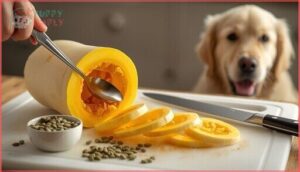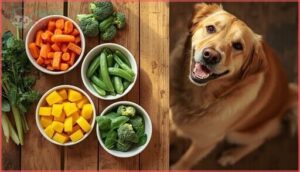This site is supported by our readers. We may earn a commission, at no cost to you, if you purchase through links.
Your dog’s curious snout nudges the cutting board as you slice yellow squash for dinner. That hopeful stare raises the question many pet owners face: can dogs eat yellow squash?
The answer is yes—yellow squash is safe for dogs when prepared properly. This bright vegetable offers legitimate nutritional value, including vitamins A and C, potassium, and fiber that aids digestive health.
The key lies in how you serve it. Plain, cooked yellow squash makes a healthy low-calorie treat, but you’ll need to avoid seasonings, remove seeds for smaller dogs, and introduce it gradually to prevent stomach upset.
Table Of Contents
- Key Takeaways
- Can Dogs Eat Yellow Squash?
- Nutritional Benefits of Yellow Squash for Dogs
- How Yellow Squash Supports Canine Health
- Preparing Yellow Squash Safely for Dogs
- How Much Yellow Squash Can Dogs Eat?
- Possible Side Effects and Risks
- Comparing Yellow Squash to Other Dog-Friendly Vegetables
- Tips for Adding Yellow Squash to Your Dog’s Diet
- Frequently Asked Questions (FAQs)
- Can my dog eat cooked yellow squash?
- What is the best vegetable for dogs?
- Should I feed my dog raw or cooked squash?
- Can I give squash to my dog every day?
- How to prepare yellow squash for dogs?
- Can dogs eat squash with skin?
- How much squash should I give my dog?
- How much yellow squash can I give my dog?
- Can I feed my dog raw yellow squash?
- Can I give my dog yellow squash seeds?
- Conclusion
Key Takeaways
- Yellow squash is safe for dogs when cooked plain (steamed or boiled), with all seeds and seasonings removed, and introduced gradually to avoid digestive upset.
- This vegetable provides legitimate nutritional benefits including vitamins A and C, potassium, and fiber that supports digestive health, hydration, and weight management at only 18 calories per cup.
- Portion control matters—follow the 10% treat rule and adjust serving sizes based on your dog’s weight, from 1 tablespoon for extra small dogs to 4 tablespoons for extra large breeds, served 2-3 times weekly.
- Never add butter, salt, garlic, onion, or xylitol to squash, and consult your veterinarian before feeding it to dogs with diabetes, kidney disease, or other health conditions.
Can Dogs Eat Yellow Squash?
Yes, dogs can eat yellow squash, and it’s actually one of the safer vegetables you can share with your pup. That said, there are important guidelines to follow to make sure it’s both safe and beneficial.
If you’re exploring other safe options for your dog, you might also wonder about whether dogs can safely chew on raw ham bones.
Let’s cover what you need to know about feeding yellow squash to your dog.
Is Yellow Squash Safe for Dogs?
Good news: yellow squash isn’t toxic to dogs. Your pup can enjoy this vegetable safely when you prepare it right.
Squash safety for dogs depends on proper handling—cooked flesh without added salt or seasonings works best. The challenge isn’t squash toxicity but preparation.
Some dogs may have canine allergies or sensitivities, though these are rare. Safe feeding practices support dog nutrition and pet wellness while offering vegetables for dogs with real canine diet and nutrition value.
When including yellow squash in your pet’s diet, be sure to understand the risks of toxic squash and take precautions to keep your dog safe.
Recommended Serving Methods
Steam yellow squash for four to six minutes until tender—this gentle cooking method preserves nutrients while supporting dog digestive health. Roasting tips include using no oil or a light drizzle, cooking at 350°F for twelve to fifteen minutes.
For frozen treats, dice plain squash and freeze in single portions. Safe handling means removing seeds, avoiding seasonings, and practicing portion control. Always serve cooled vegetables for dogs.
Potential Risks and Precautions
Even safe foods carry some risk. Watch for digestive issues like gas or loose stools if you introduce yellow squash too quickly. Some dogs develop food allergy symptoms—itching, facial swelling—after eating squash for the first time.
Seeds and skin pose choking hazards in small breeds. Follow feeding guidelines carefully: never add butter, salt, or xylitol. Dogs with diabetes or kidney conditions need health warnings before trying new vegetables.
Nutritional Benefits of Yellow Squash for Dogs
Yellow squash isn’t just safe food for your dog—it’s actually packed with nutrients that can support their overall health. This humble vegetable brings vitamins and minerals, and other beneficial compounds to the bowl.
Let’s look at what makes yellow squash a nutritional win for your canine companion.
Key Vitamins and Minerals
Yellow squash delivers vitamin A, which helps your dog maintain healthy vision and skin. Each cup provides potassium to support heart function and muscle contractions.
You’ll also find modest amounts of calcium and magnesium that contribute to bone strength and mineral balance. These nutrients work together, supporting nutrient absorption and offering antioxidant protection against cellular damage—all while keeping calories low for canine nutrition.
Hydration and Fiber Content
Your dog’s digestive health thrives on the 95 percent water content in yellow squash, which boosts fluid intake and helps prevent dehydration. Each 100-gram serving adds about one gram of gentle insoluble fiber that aids stool regularity without causing irritation.
This combination of moisture and fiber promotes smooth digestion, softens stool when paired with adequate water, and enhances overall nutritional benefits in your canine nutrition plan.
Antioxidant Properties
Cellular protection starts with the free radical scavenging power in yellow squash, which bolsters your dog’s natural defenses against oxidative stress. The beta-carotene and vitamin C work together through nutrient synergy to strengthen antioxidant enzymes already present in your pet’s body.
These antioxidant properties deliver three key dog health benefits for canine nutrition:
- Neutralize harmful molecules that damage DNA and proteins
- Support tissue repair processes throughout the body
- Boost overall cellular function and longevity
How Yellow Squash Supports Canine Health
Yellow squash doesn’t just add variety to your dog’s bowl—it actually works behind the scenes to support their body in several important ways.
The fiber, vitamins, and moisture all contribute to everyday health functions that keep your dog feeling their best.
Here’s how this simple vegetable can make a real difference in three key areas.
Digestive Health and Stool Consistency
Think of your dog’s digestive tract as a finely tuned system—yellow squash can help keep it running smoothly. The insoluble fiber aids regular bowel movements and softer stools, while high water content facilitates hydration and gut balance. This gentle fiber intake won’t overwhelm your dog’s system when portioned correctly.
If you’re managing digestion issues, proper stool quality becomes your best feedback tool.
| Digestive Benefit | How Yellow Squash Helps | What to Watch |
|---|---|---|
| Bowel Movements | Fiber promotes regularity without straining | Too much causes loose stools |
| Stool Quality | Water content softens hard stools naturally | Monitor consistency daily |
| Gut Balance | Low-fat, plain preparation enables gentle digestion | Remove seeds and skin first |
Weight Management and Satiety
When your dog needs to slim down, yellow squash becomes a low-calorie ally that fills the bowl without packing on pounds. One cup provides roughly 18 calories yet delivers fiber benefits that trigger satiety signals, helping your pet feel satisfied longer. This aids healthy snacking and portion control without sacrificing nutrition for dogs.
- High water content increases meal volume while keeping caloric intake minimal
- Soluble fiber slows digestion, extending fullness between feedings
- Low energy density allows larger portions during weight loss programs
- Mixing squash with regular food enhances digestive health and appetite regulation
- Gradual introduction aligns with canine dietary needs and facilitates sustainable weight management
Skin, Coat, and Eye Health
You might be surprised how a simple vegetable can improve what you see on the outside. Yellow squash delivers vitamin A for clear eye care and potassium for skin hydration, promoting your dog’s health from the inside out. Combined with healthy grooming and nutrient balance, these nutritional benefits translate into noticeable coat shine and overall canine health improvements.
| Nutrient | Benefit for Dogs |
|---|---|
| Vitamin A | Enhances cornea health and clear vision |
| Potassium | Maintains skin hydration and barrier function |
| Vitamin C | Protects skin cells from oxidative damage |
| Water Content | Enhances coat shine and fur luster |
| Fiber | Promotes overall nutrition for dogs and wellness |
Preparing Yellow Squash Safely for Dogs
Preparing yellow squash the right way makes all the difference between a healthy snack and a potential stomach ache. The good news is that proper preparation isn’t complicated—it just requires a few simple steps.
Let’s walk through the safest cooking methods, what to remove before serving, and which ingredients to keep far away from your dog’s bowl.
Cooking Methods (Steaming, Boiling, Roasting)
Your cooking method shapes how well your dog absorbs the nutrients in yellow squash. Each approach brings distinct benefits to your pet’s vegetable diet.
- Steaming benefits: Preserves vitamins and minerals while softening squash for easy digestion
- Boiling drawbacks: Leaches water-soluble nutrients into cooking water, reducing nutritional value
- Roasting flavors: Concentrates natural sweetness but requires careful monitoring to avoid charring
- Plain preparation: Essential for dog health and pet food safety
- No added fats: Aids dog care and wellness goals
Removing Seeds and Skin
After you’ve steamed, boiled, or roasted your squash, seed extraction and skin removal complete your prep work. Yellow squash skin is edible, but peeling it aids digestion ease and prevents potential choking. Slice the squash into rings, then scoop out seeds with a small spoon to maintain fiber balance without overload. Pat the pieces dry before mixing into meals for ideal nutrient preservation.
| Prep Step | Benefit for Your Dog |
|---|---|
| Remove seeds | Smoother texture, easier digestion |
| Peel skin | Reduces choking risk, faster chewing |
| Rinse and dry | Prevents watery kibble mix |
Avoiding Toxic Ingredients and Seasonings
Your plain, unseasoned squash is ready—but one careless dash of seasoning can turn a healthy treat into a gastrointestinal emergency. Hidden toxin dangers lurk in everyday kitchens, so toxic ingredient lists matter for dog food safety.
Watch for:
- Onion powder and garlic salt, which damage red blood cells
- Xylitol-sweetened sauces that trigger seizures
- Salt-heavy spice blends causing electrolyte imbalance
- Butter or oil adding unnecessary fats
Safe seasoning alternatives? None. Plain wins every time.
How Much Yellow Squash Can Dogs Eat?
Yellow squash can be a healthy treat, but portion control matters. Too much of any new food can upset your dog’s stomach, so you’ll want to start small and watch for any digestive changes.
The right amount depends on your dog’s size and their overall daily diet.
Portion Sizes by Dog Size
Your dog’s size determines how much yellow squash you can safely offer. Extra small dogs (2–10 pounds) should get 1 tablespoon per serving, while small dogs (11–20 pounds) can have 1 to 2 tablespoons. Medium dogs (21–50 pounds) do well with 2 to 3 tablespoons, and large dogs (51–90 pounds) can handle 3 to 4 tablespoons. Extra large dogs (91+ pounds) receive up to 4 tablespoons.
These serving sizes work two to three times per week. Following size-based portions helps you align with canine dietary needs without exceeding your pet’s calorie intake, making dog food advice practical and suited to individual health requirements. Some pet owners may also want to learn more about the benefits of dietary fiber found in squash for dogs.
The 10% Treat Rule
Once you’ve measured the right portion, you’ll want to follow the ten percent treat rule. All treats—yellow squash included—should make up no more than ten percent of your dog’s daily calories. That leaves ninety percent for complete and balanced meals.
All treats, including yellow squash, should make up no more than ten percent of your dog’s daily calories
This approach to treat portion control promotes healthy snacking while preventing nutritional imbalance. Calorie tracking matters because feeding dogs squash alongside other rewards can quickly add up. When you’re creating dog treat recipes or mixing squash with regular dog food, always account for total daily intake.
Following the ten percent guideline keeps dog nutrition on track and helps you provide sound pet owner guidance rooted in canine dietary needs.
Possible Side Effects and Risks
Yellow squash is generally safe for dogs, but it’s not without potential downsides.
Some dogs experience mild digestive issues when they first try it, while others may have sensitivities you wouldn’t expect.
Here’s what to watch for when introducing this vegetable to your dog’s routine.
Digestive Upset (Gas, Diarrhea, Constipation)
Too much yellow squash can throw your dog’s digestive system off balance. Gas and bloating often develop when fiber-rich vegetables overwhelm the gut, causing bacteria to work overtime breaking down undigested carbohydrates.
You might notice loose stools or diarrhea if you introduce squash too quickly. On the flip side, some dogs experience constipation, especially when dehydration combines with sudden fiber increases in their diet.
Allergic Reactions and Sensitivities
True food allergies in dogs are uncommon, yet your pet can develop sensitivity to yellow squash even without prior reactions. Allergic reactions involve an immune overreaction to harmless proteins, triggering symptoms that range from mild itching to life-threatening anaphylaxis.
Watch for these food allergy symptoms in dogs:
- Persistent skin itching or hives after eating squash
- Vomiting or diarrhea within hours of consumption
- Facial swelling around the muzzle or eyes
- Difficulty breathing requiring immediate veterinary attention
Allergy testing and elimination diets help identify triggers for reaction prevention.
Special Considerations for Dogs With Health Issues
Certain health conditions require you to adjust your dog’s diet carefully before adding yellow squash. Dogs with kidney disease need limited protein and controlled mineral intake, while those with heart conditions benefit from low-sodium foods.
Metabolic issues like diabetes demand consistent carbohydrate management. Always seek veterinary guidance for dog owners when your pet has liver function concerns, gastrointestinal health problems, or food allergies to maintain proper nutritional balance.
Comparing Yellow Squash to Other Dog-Friendly Vegetables
Yellow squash isn’t the only vegetable you can safely share with your dog. Understanding how it stacks up against other dog-friendly options helps you make the best choices for your pet’s diet.
Let’s compare yellow squash to other vegetables that might already be in your kitchen.
Zucchini Vs. Yellow Squash
You’ll find these two summer squash varieties act like nutritional twins for your dog. Zucchini and yellow squash both deliver vitamin A, potassium, and fiber, supporting canine nutrition without meaningful differences.
Zucchini’s firmer texture holds up better during steaming, while yellow squash softens faster—helpful if your dog prefers mushier bites. Both squash varieties meet the same vegetable safety standards, offering excellent vegetable alternatives for dogs needing low-calorie treats.
Butternut, Acorn, and Pumpkin Squash
Winter squash varieties like butternut squash, acorn squash, and pumpkin bring unique benefits to your dog’s bowl.
Butternut squash offers creamy vitamin C for tissue repair, while acorn squash delivers magnesium that helps process other minerals.
Pumpkin remains the go-to remedy for mild stomach upsets, thanks to its fiber-rich profile. All three require careful squash preparation—remove seeds and skin before steaming to support healthy dog digestion.
Vegetables to Avoid
Not every vegetable belongs in your dog’s dish. Some pose real threats to gastrointestinal health and overall well-being. Here’s your toxic plant list to keep your pup safe:
- Onions and garlic cause anemia even in small amounts—garlic toxicity develops from any form, including powders.
- Nightshade vegetables (tomatoes, peppers) carry solanine that may trigger joint inflammation and nightshade risks.
- High-oxalate greens (spinach, beet greens) raise oxalate concerns for kidney-prone dogs.
- Raw or fried potatoes rank high among starchy foods that spike blood sugar.
- Raw cabbage generates uncomfortable gas, compromising digestive comfort.
Smart vegetable preparation for dogs means choosing safer dog treat options over risky picks. When evaluating fruit toxicity and vegetable safety, always check ingredients before sharing your plate.
Tips for Adding Yellow Squash to Your Dog’s Diet
You’ve decided yellow squash is safe for your dog—now comes the practical part. Introducing any new food takes a bit of thought and planning to avoid digestive trouble.
Here’s how to add yellow squash to your dog’s routine in a way that’s both safe and enjoyable.
Mixing With Regular Dog Food
When you’re ready to add squash to your dog’s bowl, a gradual introduction protects digestive balance and prevents upset. Start with a 10 percent squash-to-kibble ratio, then increase by 10 percent every three days. This slow approach aids canine nutrition and helps you spot food allergies early.
| Day Range | Squash Percentage | Kibble Percentage |
|---|---|---|
| Days 1–3 | 10% | 90% |
| Days 4–6 | 20% | 80% |
| Days 7–9 | 30% | 70% |
Always steam or boil the squash, then mash it smooth—no seeds, skins, or seasonings. Mixed diets work best when you monitor your dog’s stool and appetite for 24 to 48 hours after each increase. If discomfort appears, dial back the portion. Feeding squash to dogs enhances dog food palatability, especially for picky eaters, while delivering nutritional benefits without excess calories. Keep fresh water available, and remember: squash supplements your pet’s complete diet under careful pet owner guidance, never replaces it.
Homemade Dog Treat Ideas
Making homemade treats lets you control ingredients and boost pet nutrition. Yellow squash pairs well with safe staples for nutritional benefits of squash while keeping calories low.
- Crunchy Biscuits: Mix mashed squash, oat flour, and unsweetened applesauce; bake at 350°F until firm
- Veggie Bites: Blend shredded squash with egg and almond flour; bake 15 minutes at 325°F
- Frozen Popsicles: Combine pureed squash with plain yogurt; freeze in silicone molds
- Peanut Butter Treats: Fold squash into natural peanut butter and oats for chewy dog treat recipes
- Dehydrated Snacks: Slice thin, dry at 145°F for portable vegetables for dogs rewards
Consulting Your Veterinarian
Before introducing yellow squash or any new food, schedule a vet consultation to review your pet’s health history. Your veterinarian can recommend portion sizes, suggest diagnostic tests if sensitivities arise, and create customized treatment plans for dogs with diabetes or kidney issues.
Regular veterinary care ensures animal wellness and catches problems early. That expert guidance turns a simple veggie into safe pet care.
Frequently Asked Questions (FAQs)
Can my dog eat cooked yellow squash?
Yes, your dog can eat cooked yellow squash when it’s prepared plain—steamed or boiled until soft, with no butter, salt, or seasonings that compromise pet food safety and canine digestion.
What is the best vegetable for dogs?
No single “best” vegetable exists for all dogs.
Top veggies like zucchini, pumpkin, and carrots each offer unique canine health benefits—from hydration to fiber—making variety the smartest approach to dog nutrition.
Should I feed my dog raw or cooked squash?
Cooked squash wins for canine health. Steaming or boiling softens fiber, easing digestion and nutrient absorption.
Raw squash poses choking risks and may trigger mild gastrointestinal upset, especially in sensitive dogs.
Can I give squash to my dog every day?
You can add squash to your dog’s daily menu in small portions—just a few tablespoons for small breeds or up to half a cup for larger canine companions, supporting digestive health without overdoing it.
How to prepare yellow squash for dogs?
Steam or boil plain yellow squash until soft, then remove all seeds and thick skin. Cut into bite-sized pieces and cool completely.
Never add salt, butter, garlic, or seasonings that harm canine health.
Can dogs eat squash with skin?
Yes, dogs can eat yellow squash skin in moderation. The soft, fiber-rich peel aids digestion when cooked until tender, but gradual introduction helps you monitor your dog’s tolerance and avoid digestive upset.
How much squash should I give my dog?
Your dog’s daily squash allowance depends on size and calorie intake management.
For squash portion control, follow dog size guidelines: small breeds need one to two tablespoons, while large dogs can handle up to one cup.
How much yellow squash can I give my dog?
For medium-sized pups, one to two small cups of steamed squash daily works as a supplement.
Smaller breeds start with a tablespoon, while larger dogs can handle up to half a cup per meal.
Can I feed my dog raw yellow squash?
You can offer raw yellow squash in small amounts, but cooking improves dog digestion and reduces raw squash risks.
Remove seeds and skin, introduce gradually, and monitor for squash allergies following safe feeding guidelines.
Can I give my dog yellow squash seeds?
You should remove seeds before offering yellow squash to your dog. Seeds can irritate the gut and cause digestive blockage, especially in dogs with sensitive stomachs or gastrointestinal health concerns.
Conclusion
Your dog doesn’t need to squash their excitement—yellow squash earns its place as a nutritious, low-calorie addition to their diet. The question “can dogs eat yellow squash” has a clear answer: yes, when you prepare it plain, cook it thoroughly, and serve appropriate portions.
Start small, watch for digestive changes, and consult your veterinarian about your dog’s specific needs. This simple vegetable can support their health without complicating mealtime.
















